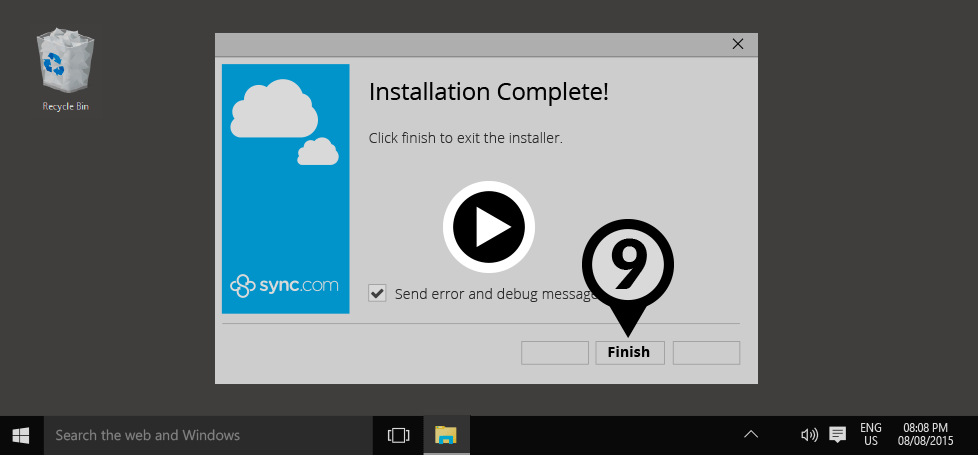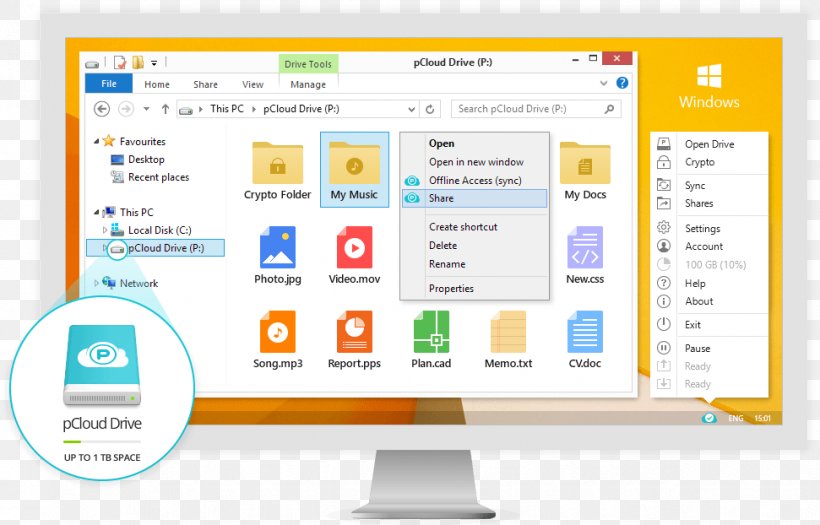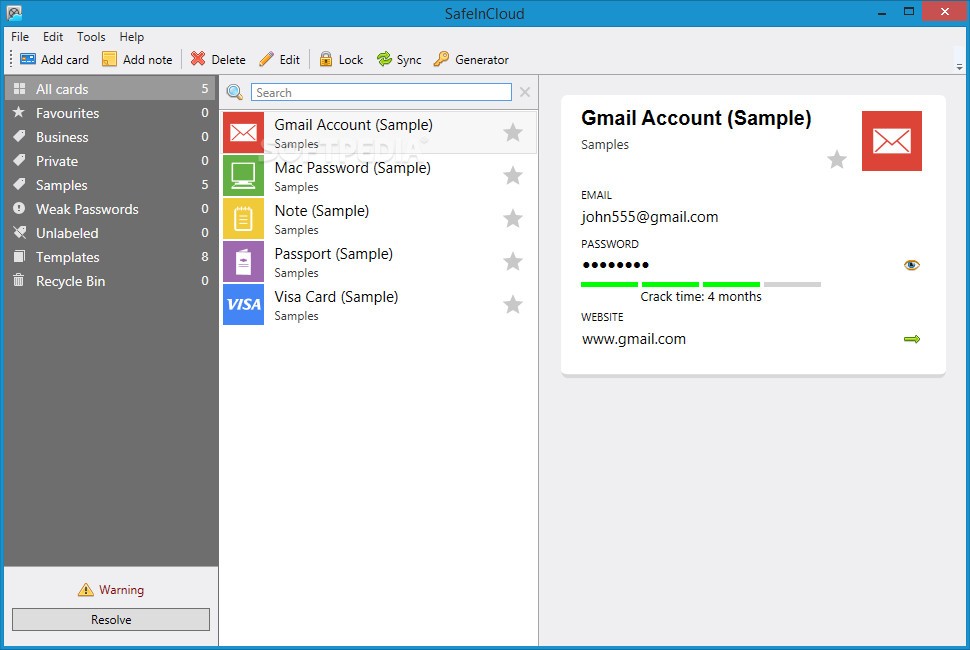Some things never change. Like our pricing! Instead of growing revenue by raising prices, we’ve chosen to spend our time improving the FME platform. We believe that by adding more value with each FME release, we’ll keep our current users happy and attract new customers. And it’s worked! Everything from Hulu and Dropbox to Gmail and Office 365 is hosted in the cloud, not on your personal computer or phone. How secure is the cloud? It’s natural to wonder if your data is safe when it’s stored in the cloud infrastructure. After all, your files, photos and videos are being stored on servers that are not under your control. Lots of storage space. Share public folders. Mobile and desktop apps. Safe In Cloud app for Windows allows you to access your data from a PC. Safe In Cloud is a complete Password Management Solution for your PC. It can automatically import the data from your old. If your cloud storage works through a Web app, look for 'https' instead of 'http' in front of the URL in your browser's address bar. That extra 's' indicates the form is using secure HTTP. If you have a standalone cloud storage app installed on your computer, check to be sure that app uses some type of encryption for its Internet exchanges.
About SafeInCloud

SafeInCloud 20.5.2 is a free and lightweight password manager that saves your password database to the cloud of your choice. For starters, SafeInCloud is a Windows desktop application in this instance which synchronizes with its Android and iOS applications via an online service of your choice. The mobile applications are not free, but you can use them for a one-time nominal fee. This download is licensed as freeware for the Windows (32-bit and 64-bit) operating system/platform without restrictions. SafeInCloud is available to all software users as a free download for Windows.
Is SafeInCloud safe to download?We tested the file SafeInCloud_Setup.msi with 24 antivirus programs and it turned out 100% clean. It's good practice to test any downloads from the Internet with trustworthy antivirus software.
Does SafeInCloud work on my version of Windows?
Older versions of Windows often have trouble running modern software and thus SafeInCloud may run into errors if you're running something like Windows XP. Conversely, much older software that hasn't been updated in years may run into errors while running on newer operating systems like Windows 10. You can always try running older programs in compatibility mode.
Officially supported operating systems include 32-bit and 64-bit versions of Windows 10, Windows 8, Windows 7 and Windows Vista.
 What versions of SafeInCloud are available?
What versions of SafeInCloud are available?The current version of SafeInCloud is 20.5.2 and is the latest version since we last checked. This is the full offline installer setup file for PC. This site has hosted other versions of it in the past such as 20.5.0, 20.4.0, 20.3.3, 20.3.2 and 20.3.0. At the moment, only the latest version is available.
Alternatives to SafeInCloud available for download
- LastPass Password ManagerVersatile cloud-based password manager which integrates well with Chrome and Firefox combining high-level encryption protected with a master password.
- ButtercupAES 256-bit encryption with this versatile and secure password manager.
- CryptSyncSynchronize folders while encrypting the contents in one folder.
- SanDisk SecureAccessAdds an encrypted, password-protected vault to SanDisk devices with drag-and-drop and sync.
- Sticky PasswordIntelligent password manager and form filler for web and usual programs.
- Box SyncAn alternative service to Dropbox that can sync files automatically.
- Google Backup and SyncCloud storage utility that integrates with Google services and your PC with mobile device support.
- C-Organizer ProPersonal information manager and personal time-keeper with support for business functions.
- MediaFire DesktopConnects your PC with your online mediafire cloud account to share data, synchronize and create data backups.
Saving documents, photos, videos and reports on a computer’s hard drive? That’s becoming almost quaint. Today, people are more frequently saving their files in the cloud, storage space not located in their computers or devices but on servers hosted by third-party providers.
The positives of storing data and files in the cloud are many: You won’t clutter your computer. If your laptop, tablet or smart phone crashes, you’ll still have access to your files. And it will take you a long time to ever use up all the space offered by most cloud providers.
But you might have concerns about cloud computing, including data protection, security threats, and potential data loss. You might worry that all those videos, photos, and reports might be vulnerable to data breach and hackers who could break into your cloud provider’s servers.
Or maybe you worry that your provider’s servers will crash, causing all those photos of your summer vacations or videos of your children’s elementary school graduation to disappear.
Here’s some reassurance, though: Information stored in the cloud is likely to be more secure than are files, images and videos stored on your own devices. Why? Cloud companies often rely on far more robust cybersecurity measures to protect your sensitive data.
What is the cloud?
What is the cloud? You've probably used it more than you think. Ever write an essay that you saved in Google Docs? Then you've used the cloud. Ever watch a movie on Netflix, stored images in Dropbox, or sent email messages through Yahoo Mail? Those are all cloud services.
At its most basic, the cloud refers to any type of software or service that isn't located on your personal computer or devices but instead runs on the internet. The files, images and videos that you save on cloud services are stored on the servers of third parties, companies such as Amazon, Google, and Microsoft*.
You can then get at these files whenever you are using a device connected to the internet. If you've saved photos from your most recent trip to the beach, you don't have to wait until you're at your laptop computer to access them. You can find them by logging onto the internet from any computer or device anywhere.
Popular cloud service providers include Google Cloud Platform, Amazon Web Services, and Microsoft Azure, to name a few. Everything from Hulu and Dropbox to Gmail and Office 365 is hosted in the cloud, not on your personal computer or phone*.
How secure is the cloud?
It’s natural to wonder if your data is safe when it’s stored in the cloud infrastructure. After all, your files, photos and videos are being stored on servers that are not under your control. You might wonder how vulnerable these servers are to cyberthieves.
Here's the truth, though: The data that you save with cloud service providers may likely be safer than the information you've stored in your computer's hard drive. Remember, hackers can use malware and phishing emails to get the information stored on your own devices. They might freeze your computer, demanding a ransom before they'll release the files and data they've frozen.
The security measures undertaken by larger companies providing cloud services are likely to be more robust and powerful than what you have protecting your home computer and devices.

Why is the cloud security so robust?
What makes cloud storage so safe? First, servers are usually located in warehouses that most workers don’t have access to. Secondly, the files stored on cloud servers are encrypted. This means that they are scrambled, which makes it far harder for cybercriminals to access.
Here is a look at some of the security measures that cloud providers frequently use to protect your data.
Consistent security updates
How often do you ignore those notifications to update your operating system, browser or email service? That’s a no-no in the world of computer security. Those updates often contain tools designed to protect your devices from the latest viruses or malware.
When you store your data in the cloud, though, the companies overseeing the servers should be consistently updating their security measures. You won’t have to worry about forgetting to run an update. Your cloud service provider will regularly update its security measures.
AI tools and auto-patching

Cloud providers are also turning to artificial intelligence, or AI, to help protect your data. This is important: It's not easy to find experienced security professionals to oversee data. Cloud providers, though, can instead turn to AI to tackle at least the first level of security analysis. These programs rely on built-in algorithms to seek out and identify possible vulnerabilities in security measures.
Built-in firewalls
Cloud providers rely on firewalls, too, to help protect your files. As the name suggests, this technology acts a bit like a wall keeping your data safe.
Firewalls, which can be hardware- or software-based, apply rules to all of the traffic coming into a network. These rules are designed to filter out suspicious traffic and to keep your data behind the wall. This makes it more difficult for hackers to slip malware or viruses past the security measures used by your cloud service provider.
Redundancy (ultra-backed-up data)
But what about hardware failures or power outages? Will you be able to access your data if your cloud provider suffers a natural disaster or large-scale outage?
Yes, because most of the biggest cloud providers practice redundancy. This means that they copy your data several times and store them on many different data centers. This way, if one server goes down, you can access your files from a back-up server.
Third-party security testing
Your cloud provider should also hire outside security companies to test their servers and software regularly to make sure they are safe from hackers, cybercriminals and the latest malware and viruses. This outside testing boosts the odds that your cloud provider will have the defenses needed to keep your files away from hackers.
What precautions can you take to boost your cloud security?
Lightweight torrent client. Are you already storing your files in the cloud? If so, you can take certain steps to help enhance the security of that data.
Encrypt your data
First, make sure you send your files to a cloud services provider that encrypts your data. You want to make it as difficult as possible for hackers to get at your information. Storing your images and files with a provider that relies on encryption will give hackers pause. It’s easier for them to steal data that hasn’t been scrambled.
Perform data backups
Make sure you only work with cloud providers that back up your data. You don’t want all your information stored on just one server. If that server goes offline, you won’t be able to access your data. You might also consider backing up your most sensitive information in your own external hard drives even if you are saving it in the cloud. This will provide you with an extra layer of protection should something happen with your cloud provider.
Enable two-factor authentication
You can make life more difficult for hackers by enabling two-factor authentication. As the name suggests, two-factor authentication requires you to provide two pieces of information when logging onto a site.
Say you are logging onto your bank's online site. First, you provide your username and password, as usual. Then you wait for your bank to send a code to your email address or phone. You then enter this code online to access your accounts. This extra step makes it more difficult for hackers to get at your emails, personal information or financial information.
Cyber threats have evolved, and so have we.
Comprehensive protection from the ever-changing threats to your connected world. NortonTM 360 with LifeLockTM
Cloud Desktop Pc
* The inclusion of websites, links, and/or providers does not imply endorsement or support of any companies, materials, products and/or providers listed herein.
Safe In Cloud Desktop Services
Editorial note: Our articles provide educational information for you. NortonLifeLock offerings may not cover or protect against every type of crime, fraud, or threat we write about. Our goal is to increase awareness about cyber safety. Please review complete Terms during enrollment or setup. Remember that no one can prevent all identity theft or cybercrime, and that LifeLock does not monitor all transactions at all businesses.
Virtual Desktop In The Cloud
Copyright © 2021 NortonLifeLock Inc. All rights reserved. NortonLifeLock, the NortonLifeLock Logo, the Checkmark Logo, Norton, LifeLock, and the LockMan Logo are trademarks or registered trademarks of NortonLifeLock Inc. or its affiliates in the United States and other countries. Firefox is a trademark of Mozilla Foundation. Android, Google Chrome, Google Play and the Google Play logo are trademarks of Google, LLC. Mac, iPhone, iPad, Apple and the Apple logo are trademarks of Apple Inc., registered in the U.S. and other countries. App Store is a service mark of Apple Inc. Alexa and all related logos are trademarks of Amazon.com, Inc. or its affiliates. Microsoft and the Window logo are trademarks of Microsoft Corporation in the U.S. and other countries. The Android robot is reproduced or modified from work created and shared by Google and used according to terms described in the Creative Commons 3.0 Attribution License. Other names may be trademarks of their respective owners.

